
Related
Guests
- Jane Mayerstaff writer for The New Yorker and author of the new book, Dark Money: The Hidden History of the Billionaires Behind the Rise of the Radical Right. She is also author of The Dark Side: The Inside Story of How the War on Terror Turned into a War on American Ideals.
Democrats and Republicans are expected to spend about $1 billion getting their 2016 nominee elected. There’s a third group that will spend almost as much. It’s not a political party, and it doesn’t have any candidates. It’s the right-wing political network backed by the billionaire Koch brothers, Charles and David Koch, expected to spend nearly $900 million in 2016. The Kochs’ 2016 plans come as part of an effort to funnel hundreds of millions of dollars to conservative candidates and causes over the last four decades. The story of the Koch brothers and an allied group of billionaire donors is told in a new book by New Yorker reporter Jane Mayer, “Dark Money: The Hidden History of the Billionaires Behind the Rise of the Radical Right.” Mayer traces how the Kochs and other billionaires have leveraged their business empires to shape the political system in the mold of their right-wing agenda.
Transcript
JUAN GONZÁLEZ: I wanted to go back to the beginning of your book. You start the book with the inauguration of President Obama in January of 2009 and all the attention and the enthusiasm that that generated across the world and in the United States. But then you also say that that very month there was a secret meeting that was convened by the Kochs of billionaires and multimillionaires with a completely different agenda. If you could talk about that?
JANE MAYER: Yeah, well, I’m glad you ask, because the book is not just about the Kochs. And the Kochs, on their own, probably would not be able to have the kind of influence they have. But what they’ve done is kind of a magic trick. They’ve attracted around them—they’ve purposefully built what they call an unprecedented network—it’s a pipeline, they talk about it, too—where they’ve gathered about 400 other extraordinarily wealthy conservatives with them to create a kind of a billionaire caucus almost. And that’s the group that met, just as Obama was being inaugurated. Soon after that, they met to figure out: How can we obstruct this? They regarded it as a catastrophe that Obama had been elected, and they wanted to see if they could stop change from taking place in the country and keep the order the way it had been for them during the Bush years, and maybe even push it further to the right.
So this is not—it’s an organization that I think people need to understand is not just about elections. They’ve been playing a long game that started 40 years ago, when Charles Koch really got involved in politics in the beginning. And they wanted to change not just who rules the country, but how the country thinks. They’re very antigovernment. They are—and they have pushed this kind of antigovernment line for 40 years through many different channels. And it’s kind of a war of ideas as much as anything else.
JUAN GONZÁLEZ: Well, you also talk about the secrecy with which they operate. You quote Fred Koch, the family patriarch, as saying, “The whale that spouts is the one that gets harpooned.”
JANE MAYER: Yes. And so—and I’ve talked to—many operatives who have worked for the Kochs are interviewed in this book. And one of them told me, they’re not just under the radar, they are underground. And they, for many years, just were almost invisible. They used to—the Kochs, themselves, used to call Koch Industries the biggest company that you’ve never heard of. It’s the second-largest private company in America. It has $115 billion of business a year. And most people didn’t know what it was. Many Americans use their products, they don’t realize—Dixie cups, Stainmaster carpet, Lycra, Georgia-Pacific lumber, there’s Quilted Northern toilet paper. There are so many products that they’ve flooded the American market with, yet most people don’t realize that that is coming from these two brothers who own most of the company and are pouring the money into far-right-wing politics.
AMY GOODMAN: We’re going to keep talking about this with Jane Mayer, staff writer for The New Yorker, author of the new book, Dark Money: The Hidden History of the Billionaires Behind the Rise of the Radical Right. Stay with us.
[break]
AMY GOODMAN: Our guest for the hour is Jane Mayer, staff writer for The New Yorker, author of the new book, Dark Money: The Hidden History of the Billionaires Behind the Rise of the Radical Right. If you think about what’s happening in this country, the rise of inequality, why climate change action doesn’t happen in a more systemic way—many different issues—Jane Mayer talks about some of the reasons, the power blocs behind the major obstacles—the bloc. Start with where you’re getting your information.
JANE MAYER: Well, I interviewed hundreds of people for this. And there—I have many new documents also. I mean, one of the things that was interesting to me, I mean, I went into this kind of wondering why does the government seem so dysfunctional. As you said, why can’t something be done about global warming in Congress? All of the scientific community is going one way, Congress is going the other. American public opinion supports doing something about global warming, the Congress won’t do anything. What’s holding it up? Money, the fossil fuel interests and others. And you can see it in here.
There’s a—and it begins long ago. In about 1976, there was a plan laid by Charles Koch to build what he called a radical movement to change the way that America voted and thought. And he said we need to, quote-unquote, “destroy” the statist paradigm and start a movement. And he modeled it on the John Birch Society. He loved the secrecy of the John Birch Society. And there’s a paper that is quoted in here that he wrote in 1976 about how he was going to found a movement and launch it. So, this has been a long, long-running project. And he’s built it up. He’s an engineer. He’s extraordinarily wealthy. And he has worked with a number of very smart people to build this network that tries to sort of push, push, push the country in his direction.
JUAN GONZÁLEZ: And you also talk, when it comes—about climate change, the direct interest that Koch Industries has in climate denial, because you say—
JANE MAYER: Oh, certainly.
JUAN GONZÁLEZ: You talk about—can you talk about their refinery, the Pine Bend refinery in Minnesota, and its importance in terms of polluting the planet?
JANE MAYER: Sure. Their fortune is built on fossil fuels. I mean, they are refiners, and they have tremendous numbers of pipelines, and they own a huge amount of the tar sands that are up in Canada. And so, if America moved off fossil fuels, it would be catastrophic for their business. It’s a direct interest that they’ve got in this. And so, one of the things I do is try to follow the money in the denial of climate change, and an awful lot of it goes back to the Kochs and their circle. They have a number of other fossil fuel companies that are part of their network, their group, this group of 400 or so. The members are secret, but there’s one guest list that actually was left behind somewhere, so we’ve been able to see a little bit of who the members are—at least at one point. And it includes many well-known players and a number of fossil fuel interests.
JUAN GONZÁLEZ: I wanted to ask you about the hedge fund people that apparently are involved, as well.
JANE MAYER: Yeah.
JUAN GONZÁLEZ: Stephen Schwarzman of Blackstone, Steve Cohen of SAC.
JANE MAYER: Steven Cohen of SAC Capital, yes.
JUAN GONZÁLEZ: SAC Capital.
JANE MAYER: Uh-huh, uh-huh. No, there are a number of very well-known finance figures who are extraordinarily wealthy. And one of the things that this group has worked hard to do is to keep sort of tax breaks for billionaires, really, for hedge funds. One is the carried interest loophole, it’s called, and they wanted to keep it open. There was talk in Congress that the Democrats might try to close it. And so this brought a flood of money from the finance community into this group to shut—to keep that loophole open for them. It means that hedge fund managers pay taxes at 15 percent, which is lower than almost—you know, any decently paid American pays more in taxes than many of these people.
AMY GOODMAN: So, let’s talk about how they built their power. You got a hold of a several-hundred-page history called “Stealth: The History of Charles Koch’s Political Activities.” Where did this document come from? And tell us about the four brothers—it’s not just two, Charles and David.
JANE MAYER: Well, this is the thing. It’s an amazing family feud that took place inside this family. There are four brothers, as you say. Two of them formed one team, two formed the other team. They were in court for 20 years against each other, fighting over who was going to get to run the company and have more access to the family fortune. And one of the brothers, who was estranged—his name is Bill Koch—commissioned a history. He hired a historian, who had actually been hired previously by Koch Industries to do its own history. So, it was a historian who worked at George Mason University, and he did a history for Bill Koch of what the other brother, Charles, was doing politically. It’s called “Stealth” because he describes a secret plan by Charles to try to manipulate American politics. It’s fascinating. It’s full of new details, including this paper that I mentioned that Charles wrote in 1976 that no one’s seen before.
JUAN GONZÁLEZ: And part of the documents you uncovered was a sealed—or at least information on a sealed deposition that involved the battle between the brothers, an attempt by Charles and David to blackmail their own oldest—the eldest brother, Frederick, and to out him as gay, according to the deposition. Could you talk about that?
JANE MAYER: It’s true. It was—this is really, you know, a painful scene in this, and I think—but gives you an idea of just how rough these guys play. You’ve got three brothers trying to set up the fourth, who they thought was gay. And they basically hold a kangaroo court. They invite him in under false pretexts. He walks into the room. The three of them are facing him in chairs, and he’s supposed to sit across from them. And they accuse him of being gay. They say, “We’re going to tell our father you’re gay, unless you give us your shares in the company.” The brother that was accused, his name’s Frederick. He’s the oldest. He stood up and said, “I never want to hear about this again,” and he walked out of the room. But all of this is described in a deposition that’s remained sealed during all these years. Gives you just a glimpse, I think, of maybe how ruthless these players are.
AMY GOODMAN: How did you get a hold of it? And what happened with the company then, with Bill and Frederick?
JANE MAYER: Well, I can’t say how I got a hold of it, but I can say that it is absolutely unrefuted, that this is the real thing. And the company was—for 20 years, there was fighting between these two sets of brothers, the two against two. And in the end, Charles and David triumphed, and they run the company, own the company, for the most part. There are a few other shares that a few scattered other people have, but basically they own virtually the whole company. And the two that were left out got decent-sized inheritances and went off on their own ways.
JUAN GONZÁLEZ: Now, this is the only other part of your book that the Kochs directly challenged. They’re claiming that this information on this court battle was—especially the information in the deposition, was eventually rejected by a jury, that they triumphed and that it was actually false allegations.
JANE MAYER: Which? The allegation that they blackmailed the brother?
JUAN GONZÁLEZ: Right.
JANE MAYER: No. Well, it says that—it says in the book that Charles denied it, but this is a deposition sworn to be true by Bill Koch, who was in the room at the time. So, I think—take it for what it is. Facts are facts.
AMY GOODMAN: I want to turn to Charles Koch in his own words. Speaking at the Wichita Metro Chamber 2015 annual meeting, Koch was asked to explain what “good profit” is. His latest book is called Good Profit: How Creating Value for Others Built One of the World’s Most Successful Companies. This is a part of what he said.
CHARLES KOCH: Good profit is creating superior value in society by helping your customers improve their lives. And a business does that by—as I say, by creating superior value for its customers and by more efficiently using resources and driving creative destruction, and, while you’re doing it, do the best job of keeping people safe and protecting the environment. And if you do a superior job of all those, believe me, you will be profitable. And if you don’t, you won’t last. That’s our philosophy.
AMY GOODMAN: So that’s Charles Koch speaking in his own words. And I wanted to talk about the company and the environmentalism. In 2012, the EPA said that Koch Industries was the largest or the single biggest producer of toxic waste in the United States. In 2014, according to the Toxic Release Inventory, Koch Industries had consistently appeared among the top five U.S. producers of toxic waste.
JANE MAYER: Yeah, and there’s a University of Massachusetts in Amherst study, too, that says that they’re one of only three companies that has been among the top producers of air pollution, water pollution and climate pollution. They have a huge history of environmental violations. And they say they’ve worked hard to improve on that. And I think they probably are better than they were way back in the '90s maybe, but at that point they had some of the largest environmental judgments against them that had ever been brought in the U.S. So they have a checkered history on this subject. And I was there in Wichita when Charles Koch gave that speech, and it certainly caught my ear when he mentioned that one of the things you need to do is have a good environmental record. I'm glad he thinks that’s important.
AMY GOODMAN: So talk about climate change, as we just talked about it before, but go further with what they have done around this issue, the groups that have been set up, the money that has been funneled in to either obfuscate or deny human-induced climate change.
JANE MAYER: Well, what you have to understand is the Kochs have built kind of an assembly line to manufacture political change. And it includes think tanks, which produce papers. It includes advocacy groups, that advocate for policies. And it includes giving money to candidates. And you put those three together, and they’ve pushed against doing anything about climate change on all those three fronts at once. So you get papers that look like they’re real scientific opinions doubting that climate change is real, you get advocacy groups saying we can’t afford to do anything about it, and you get candidates who have to sign a pledge that—their largest political group is Americans for Prosperity. They have a pledge that says that if you want to get money from this—from their donors, you have to sign a pledge saying that, if elected, you will do nothing about climate change that requires spending any money on the problem. And 156 members of Congress currently have signed that pledge. So, it sort of is a recipe for how to tie the hands of the country from doing anything on this.
JUAN GONZÁLEZ: Well, who—what are some of these think tanks? And also, talk about their role with ALEC.
JANE MAYER: Well, that’s just the other thing that’s so interesting, is they’ve created a think tank and helped fund it in almost every state. In fact, in every state, there’s at least one of these think tanks. It’s called the State Policy Network. And they’ve worked with the group ALEC, that you all probably know about, which sort of funnels corporate money into lobbying in state legislatures.
AMY GOODMAN: The American Legislative Exchange Council.
JANE MAYER: That’s right, yeah. And so, they have kind of—I mean, there’s a reason that they won the name “The Kochtopus.” It’s kind of tentacles on many different levels out there and a lot of attention to state legislatures, where money goes a lot further.
AMY GOODMAN: David Koch actually ran for Congress, is that right, in 1980?
JANE MAYER: He actually ran to become vice president of the United States in 1980. And this is—one of the questions I had was—so he ran in 1980 on the Libertarian ticket, and he got something like 1 percent of the vote. He spent a huge amount of—
AMY GOODMAN: Not Congress. So, for vice president.
JANE MAYER: No, for the vice president. And it was so—which gives you an indication: They were so far right, they were running against Ronald Reagan because they thought he was too liberal. And so, at that time, you have—they really defined the furthest fringe in America, and even conservatives denounced their views. William F. Buckley called their views anarcho-totalitarianism. So, what interested me, as a question, as a reporter, was: How did this group, these two brothers and the others around them, get from the furthest fringe to the center of gravity in the Republican Party? It’s pulled their way so far during these 30 years since then.
JUAN GONZÁLEZ: You mentioned this phrase that Buckley used, “anarcho-totalitarianism.” Talk about the Freedom School and how David Koch was involved with this little-known operation—in Colorado, was it?
JANE MAYER: It is. It was in Colorado Springs, Colorado. Even before he ran as vice president on the Libertarian Party, he was, I guess, a young man in his thirties and was very attracted to this school called the Freedom School that was run by a man named [Robert] LeFevre, who had had a very odd background. He had had a lot of legal brushes. And they taught a kind of a fanatical libertarianism that was almost anarchism. The head of the school, this LeFevre, called it—himself an “autarchist,” instead of an anarchist. They wanted to shrink the government to the point where they couldn’t tax, the government couldn’t tax. They wanted to get rid of the EPA. They wanted to get rid of pretty much much of the federal government. And the historical view of this group was that the robber barons were America’s heroes and that the Gilded Age really was the golden age. And it was a completely revisionist view of America. And Charles Koch was so supportive of it, he became a trustee of the school.
AMY GOODMAN: We’re talking to Jane Mayer. When we come back, I want to find out about her own history in investigating the Kochs—did that lead to an investigation of her and her reporting?—and continue to talk about the size of the operation. Again, as we said at the beginning of the show, the Republican and Democratic parties are expected to spend each something like $1 billion in the 2016 elections. There’s another party that’s going to spend about that much—not a political party per se, but it is the $900 billion of this—$900 million, close to a billion dollars, that we’re looking at today. Jane Mayer is staff writer for The New Yorker. Her book is called Dark Money: The Hidden History of the Billionaires Behind the Rise of the Radical Right. Stay with us.
[break]
AMY GOODMAN: “Talkin’ John Birch Paranoid Blues” by Bob Dylan, here on Democracy Now!, democracynow.org, The War and Peace Report. I’m Amy Goodman, with Juan González. Our guest for the hour is Jane Mayer, staff writer for The New Yorker, author of multiple best-selling books, her most recent, Dark Money: The Hidden History of the Billionaires Behind the Rise of the Radical Right. So that song that Bob Dylan was just singing, talking about the John Birch Society, where, you know, not only Fred Koch, the patriarch of the family, Charles and David’s father, but Charles Koch also was a member of the John Birch Society. The John Birch Society called, what, General Eisenhower, President Dwight Eisenhower, a communist?
JANE MAYER: Yes, they thought Dwight Eisenhower was a communist. They saw communist conspiracies behind all kinds of things. And I have to say that I’m told that Charles Koch didn’t buy all the far-fetched conspiracy theories, and he really went in a slightly different direction. He was more preoccupied with becoming a kind of a radical economic libertarian, meaning that he wanted to get the government to just let businesses do what they wanted to do and let the free market rule America. And so he’s fought to keep taxes really low, get rid of almost all regulations on business. This is really what he’s focused on, not so much on communism.
JUAN GONZÁLEZ: And you also describe in the book how some of the gatherings of this caucus of the billionaires have also at times made it uncomfortable for the established Republican figures, like Senator John Cornyn at one point. And talk about their ability to empower the radical right in Congress.
JANE MAYER: Well, I mean, when Obama was elected, there was a dilemma within the Republican Party. It was: Do we work with him and try to get as much as we can—the sort of the old-fashioned way of politics, where you make compromises—or do we just simply go on strike and try to demonize him and obstruct everything, shut down the government? And there was a big argument, actually, that took place in front of the Koch donor group very early on. And the side that won, and won over the hearts of this donor group, was the side of Jim DeMint, who was then the senator from South Carolina, who said, “Obstruct, obstruct, obstruct.” And from that point on—and we’re talking—
AMY GOODMAN: He would later quit, right, and go to become the head of the Heritage society.
JANE MAYER: That’s right.
AMY GOODMAN: Heritage Foundation.
JANE MAYER: That’s right. But at that point, it was a choice, and this group put its money in to stop Obama any way you can. And so, part of also what I try to tell the story of here—and you have to kind of follow the money through the chapters—but is that it’s not just an election force. It’s—this club has become a force of obstruction against governing, so that when Obama proposes the healthcare plan, this group funnels money to many, many different front groups that then, unseen to the American public, pop up and oppose the healthcare plan and disrupt meetings. I don’t know if people remember those town hall meetings during, I think it was, the summer of 2010, when there was just kind of pandemonium breaking out. And a lot of that were—there were actually sort of plans laid among this group to pour money in, get people all riled up and make them think that this was going to have death squads, things like that, that were—that got people very upset.
JUAN GONZÁLEZ: And the connection to the tea party?
JANE MAYER: They put a lot of money into the tea party. I started writing about them in the summer of 2010. And at that point, the spokesmen for the Kochs were saying they had nothing to do with the tea party. I then went down to a weekend meeting that the biggest Koch group was holding, Americans for Prosperity, in Austin, Texas, and there they were giving seminars to tea party members on how to organize. So they really—and the people I interviewed down there evidently hadn’t gotten the sound bites, because there were saying, “Are you kidding? The tea party? We’ve been into the tea party before it was cool.”
And so, it’s—I think what’s interesting to me is that, as you’ve been saying, there have always been Democrats with a lot of money, Republicans with a lot of money. The history of the country has been, you know, of certainly big money players. What you’ve got here is almost like a third party that is the money party. It’s a conservative, outside pressure group that is acting as a force field, pulling the Republican Party, particularly, to the right.
AMY GOODMAN: With three-and-a-half times as many employees as the Republican National Committee.
JANE MAYER: And a larger budget by two times the budget that the Republican National Committee had in the 2012 presidential campaign. So you’re talking about really a pretty professionally organized operation. There’s a new paper that I thought was really interesting by Theda Skocpol, who’s a professor at Harvard. It came out just last week. It’s called “The Koch Effect.” And it describes what’s been built by them and their allied donors as akin to a national party.
JUAN GONZÁLEZ: Well, Jane, I’d like to ask you—in July, speaking at the NAACP annual convention in Philadelphia, President Obama praised the Koch brothers for their involvement in the campaign to reform the criminal justice system. This is what he said.
PRESIDENT BARACK OBAMA: [This is a cause that’s] bringing people in both houses of Congress together. It’s created some unlikely bedfellows. You’ve got Van Jones and Newt Gingrich. You’ve got Americans for Tax Reform and the ACLU. You’ve got the NAACP and the Koch brothers. No, you’ve got to give them credit. You’ve got to call it like you see it.
JUAN GONZÁLEZ: Well, a day after President Obama’s speech in July, we interviewed Mark Holden, senior vice president and general counsel for Koch Industries, on why the Koch brothers were getting involved in a coalition to reform the criminal justice system.
MARK HOLDEN: Charles Koch and David Koch are classical liberals who believe in expansive individual liberties in the Bill of Rights and limited government. And so, if your goals are to honor the Bill of Rights and to remove obstacles to opportunity, especially for the poor and the disadvantaged, you have to be in the criminal justice arena.
And to answer your question, you know, as Van pointed out, what worked 20 or 30 years ago doesn’t work today. And we have to have the intellectual honesty and courage and humility to correct that. In our businesses, we do that all the time when things aren’t working. And I think, to Van’s point, what we’re seeing happen in the states is really a template for what should happen at the federal level, and making sure that everything we do enhances public safety and that it honors the Bill of Rights and treats everybody in the system as individuals with dignity and respect, particularly victims, law enforcement, the incarcerated, the accused and their families.
JUAN GONZÁLEZ: That was Mark Holden, a senior counsel for the Koch Industries. This whole issue of them getting involved in criminal justice reform?
JANE MAYER: Well, I mean, Mark Holden is a very eloquent advocate for criminal justice reform. And the Kochs have long cared about criminal justice reform. But what people may not realize is that they’ve pushed a different kind of reform than most liberals have. What they would like to do is get rid of many crimes that have to do with pollution, that have to do with corporate crimes, tax crimes. They want to weaken prosecution of companies like their own.
Now, there is a tiny overlap. If you did a Venn diagram of where the far right and everybody else overlaps, they would like to see sentencing reform for drug offenders at this point, which—nonviolent drug offenders, which you’ve—you know, it’s an important issue. It’s good they’re talking about it. It’s not something they’ve cared about until 2014. And I have a new piece out in The New Yorker which notes that in 2014 they launched a huge public relations campaign to change their image. They’re involved in what David Axelrod described as one of the biggest rebranding efforts anybody’s ever launched. And I see this as certainly part of it.
And the reason I do is—you’ll see, if you read this book—there are tapes. There are tapes that were leaked out from one of their meetings, where they describe how they need to change their image. After they did not win the presidency in 2012, despite the money they put behind Mitt Romney, they went back to the drawing board, and they tried to figure out what they were doing wrong. And they did a huge number of polls. And they came to the conclusion that the public thought they were greedy and didn’t trust them. And so, they speak in this tape about how we need to prove that we have good intent and we care about other people. And at that point, they launched a number of programs that have to do with doing good works for the poor. So, I see this as quite related to that.

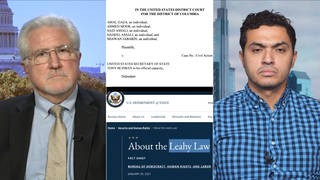

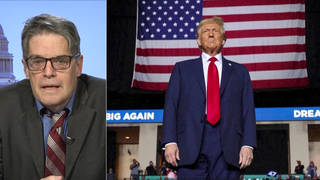
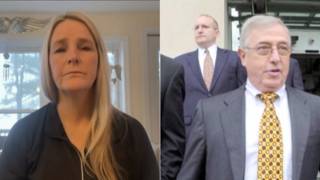





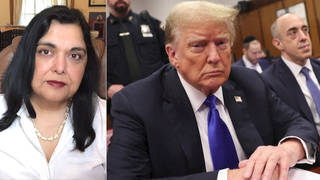
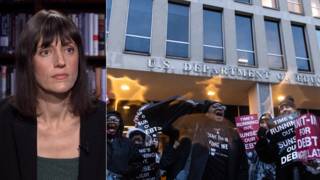
Media Options